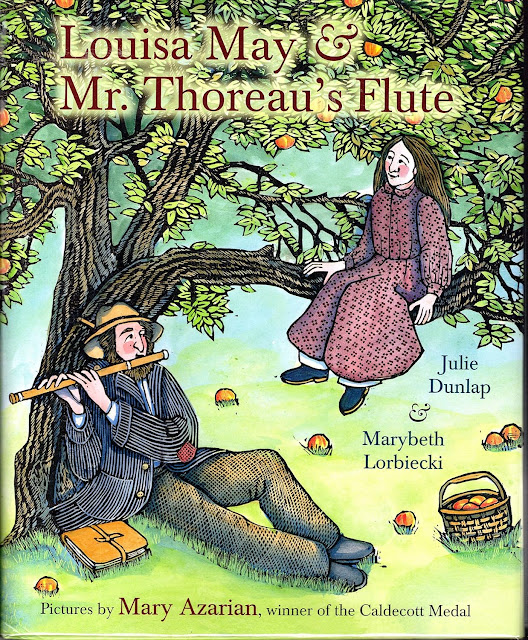Henry David Thoreau, pictured in the late 1840's, and Louisa May Alcott photographed circa 1860.
As a girl in Concord, Massachusetts Louisa May Alcott lived across the street from Ralph Waldo Emerson and was the playmate of his beloved son Waldo before he died in 1842. Her father Branson Alcott was a starry-eyed dreamer, education reformer, would-be philosopher, and failed Utopian who was in Emerson’s circle and a Transcendentalist. Henry David Thoreau sometimes baby sat her and entertained the neighborhood children with short hikes and wood lore.
Thoreau died of consumption—tuberculosis—in 1862 at age 44 shortly before Louisa’s turn as a Civil War volunteer nurse the Union Hotel Hospital in Georgetown, Virginia. She was still in Concord when he died in February and was grief stricken by the loss of her dear friend. Ten years later Louisa purchased Thoreau’s last house.
A children's book inspired by Alcott's poem and her childhood among the Concord Transcendentalists.
Thoreau’s Flute
We sighing said, “Our Pan is dead;
His pipe hangs mute beside the river
Around it wistful sunbeams quiver,
But Music’s airy voice is fled.
Spring mourns as for untimely frost;
The bluebird chants a requiem;
The willow-blossom waits for him;
The Genius of the wood is lost.”
Then from the flute, untouched by hands,
There came a low, harmonious breath:
“For such as he there is no death;
His life the eternal life commands;”
Above man’s aims his nature rose.
The wisdom of a just content
Made one small spot a continent
And turned to poetry life’s prose.
Haunting the hills, the stream, the wild,
Swallow and aster, lake and pine,
To him grew human or divine,
Fit mates for this large-hearted child.
Such homage Nature ne’er forgets,
And yearly on the coverlid ‘Neath which her darling lieth hid
Will write his name in violets.
To him no vain regrets belong
Whose soul, that finer instrument,
Gave to the world no poor lament,
But wood-notes ever sweet and strong.
O lonely friend! he still will be
A potent presence, though unseen,
Steadfast, sagacious, and serene;
Seek not for him—he is with thee.
—Louisa May Alcott
First published in the Atlantic Monthly, September 1863


No comments:
Post a Comment